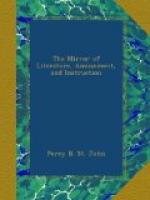A few interrogatories on each side, a joke, and its accompanying laugh, occupy brief space; when, suddenly, a general rush proclaims the load is strewed upon the ground! a chaotic mass—“old hats, old wigs, old boots, old shoes, and all the tribe of leather,” remnants of all things, the ends and the beginnings, horticultural fragments and broken crockery, the hunter’s bone and the beggar’s rags, pilfered lace suspected, and the stolen jewel, the lost gold, and the mislaid spoon: and, for a climax, rejoice! gentle reader—for when the designs of the crafty are defeated by inadvertence, or otherwise, with the weird sisters, “we should rejoice! we should rejoice!”—a bill for fifteen pounds, drawn by a lawyer for expenses, and which was taken to the acceptor by the dustman, for which he received a considerate remuneration. Complicated as this mass appears, it is all reduced to the most perfect order, and each portion arranged according to the purposes intended for. Thus, the vegetable matter, so eagerly seized upon by the pigs, contributes to keep up a supply of dairy-fed pork and Epping sausages: the bones are laid aside for the purposes of making hartshorn and phosphorus, dominoes, and apple-scoops, &c. The old boots and shoes, with the tribe of leather, after a slight examination of their utter inefficiency, find their way, through divers passages to the glue-pot. How fractured bottles, and broken glass of every description, is disposed of, is easily seen through—to the furnace; and how the old iron is appropriated, is not hard to guess. The old woollen, if perchance any should exist in the shape of a pair of innominables, after exploring the pockets, and a sigh for their insolvency, are unceremoniously cast aside along with the worthless remains of rags of every description, string, paper, &c. &c., to pass through the operation necessary for making brown paper. What still remains, of coals, and cinders unconsumed, the dustman’s perquisite, are measured first, “thence hurried back to fire:” the wood, the sifters take. Broken tiles, bricks, delf, crockery, with a variety of substances and etceteras, go towards the formation of roads. I had almost forgotten the crowning item, viz. old wigs! Towards the close of the last century, so much were they in request, that the supply was scarcely equal to the demand. Yes, in the days of Beau Tibbs, every street had its corner and every corner its shoe-black, and to every shoe-black might be traced an old wig, sometimes two. In those days of ruffles and etiquette, when a well-formed leg was advantageously displayed in whole silk stockings, shoes, and buckles, it was the custom with pedestrians, when making a call, to have their shoes wiped and touched up at the corner of the street nearest the place they were going to visit: and what so efficient for the purpose as an old wig? nothing. But, alas! those days are gone! and Beau Tibbs is gone! and, if we question where? only Echo answers.




